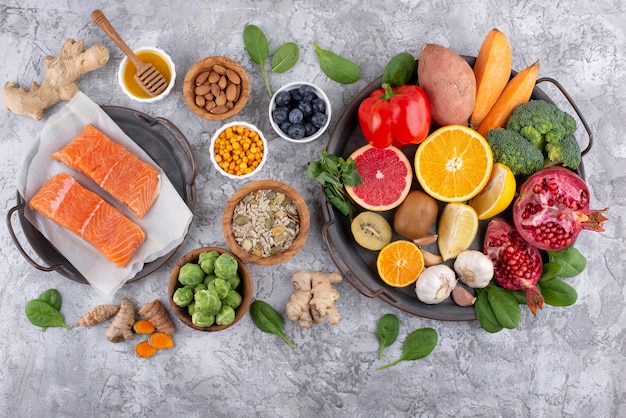Dietary fiber plays an essential role in weight loss and overall health. Even though the body does not digest fiber, it has an important impact on metabolism, appetite control, and gut health. Fiber directly influences the way your body processes food and helps manage weight effectively.
By increasing your fiber intake, you can control hunger better, reduce calorie consumption, and improve digestion. Fiber helps you stay full longer, decreasing the chances of overeating. It also supports a healthy gut, which is essential for nutrient absorption and fat metabolism.
This guide explains the types of dietary fiber, how it affects weight loss and the recommended daily fiber intake.
What is Dietary Fiber and Why It Is Important?
Dietary fiber is an indigestible carbohydrate found in foods from plants. It moves through your digestive system without being broken down, helping to regulate digestion and offering significant health benefits. Fiber is important for weight loss because it helps control hunger, reduces calorie intake, and supports gut health.
There are two main types of fiber:
-
Soluble Fiber
Soluble fiber dissolves in water and forms a gel-like substance. It helps slow digestion and keeps blood sugar levels stable. You can find soluble fiber in foods like oats, beans, lentils, apples, and citrus fruits.
-
Insoluble Fiber
Insoluble fiber does not dissolve in water and adds bulk to stool, which helps food pass through the digestive system. Insoluble fiber is found in whole grains, nuts, seeds, and vegetables like cauliflower and carrots.
Both types of fiber are important for weight loss because they help you feel full, support healthy digestion, and improve how your body absorbs nutrients.
How Does Dietary Fiber Help in Weight Loss
Dietary fiber plays an active role in weight loss by improving appetite control, reducing calorie intake, and improving digestion. It is especially helpful in preventing overeating and managing hunger.
- Promotes Fullness: Fiber-rich foods help you feel fuller for longer. Soluble fiber, in particular, absorbs water and expands in the stomach, increasing feelings of satiety and helping to curb hunger between meals.
- Regulates Blood Sugar: Fiber helps slow the digestion of carbohydrates and the absorption of sugar, keeping blood sugar levels steady. This helps reduce sugar cravings and prevents energy crashes, which often lead to overeating.
- Reduces Calorie Intake: Fiber-rich foods are generally low in calories but high in volume, meaning they fill you up without adding excessive calories. This allows you to eat more food while keeping your calorie intake in check.
- Improves Digestion: Fiber nourishes beneficial gut bacteria, supporting a healthy microbiome. A balanced gut environment is linked to better digestion, improved metabolism, and more efficient fat-burning.
Recommended Daily Fiber Intake
The recommended daily fiber intake depends on age and gender. Meeting these goals can support weight loss and improve digestion:
- Men: 30-38 grams of fiber per day
- Women: 21-25 grams of fiber per day
Many individuals fail to meet these recommendations, which can lead to digestive issues and hinder fat loss efforts. A higher fiber intake can improve digestion and support long-term weight management.
Best Sources of Dietary Fiber for Weight Loss
These are some of the best sources of fiber for losing weight:
Start Your Day with Fiber: Oatmeal, chia seeds, and whole-grain cereals provide a healthy dose of fiber in the morning.
Choose Whole Grains: Replace refined grains with whole grains like brown rice, quinoa, and whole wheat pasta for added fiber.
Add Legumes to Your Diet: Beans, lentils, and chickpeas are rich in both fiber and protein, making them perfect for weight management.
Snack on Fruits and Vegetables: Apples, pears, carrots, and leafy greens are low-calorie, fiber-filled snacks that help you stay full.
Drink Plenty of Water: Fiber needs water to work effectively in your digestive system, so stay hydrated.
Fiber Content in Common Foods
The below table shows the fiber content in various high-fiber foods:
| Food Item | Serving Size | Fiber Content (grams) |
| Lentils | 1 cup cooked | 15.6 |
| Black beans | 1 cup cooked | 15 |
| Chia seeds | 1 ounce | 10 |
| Raspberries | 1 cup | 8 |
| Oats | 1 cup cooked | 4 |
| Almonds | 1 ounce | 3.5 |
| Apple (with skin) | 1 medium | 4.4 |
| Broccoli | 1 cup cooked | 5.2 |
| Carrots | 1 cup cooked | 5 |
| Whole wheat spaghetti | 1 cup cooked | 6.3 |
Considerations When Increasing Fiber Intake
Some considerations are really important when increasing the intake of fiber. While fiber is beneficial, it’s important to gradually increase your intake to avoid digestive discomfort. Here’s how to safely add more fiber to your diet:
- Gradually add more fiber to your meals to give your digestive system time to adjust.
- Drink plenty of water to help fiber move smoothly through your digestive system and avoid bloating.
- Include a mix of both soluble and insoluble fiber in your diet for maximum benefits.
Frequently Asked Questions (FAQs)
What is the main purpose of dietary fiber?
The main purpose of dietary fiber is to help your digestive system work properly. It keeps things moving in your stomach and intestines, which helps prevent constipation. Fiber also helps you feel full for longer, so you don’t overeat, and it helps control blood sugar levels.
How much fiber per day to lose weight for a woman?
For women, it’s recommended to eat 21 to 25 grams of fiber each day to help with weight loss. Getting enough fiber helps you feel full, which can prevent overeating.
What are some soluble and insoluble fiber foods?
Here are some foods that are high in soluble and insoluble fiber:
Soluble Fiber Foods:
- Oats
- Apples
- Beans
- Carrots
- Barley
Insoluble Fiber Foods:
- Whole grains
- Nuts and seeds
- Cauliflower
- Potatoes (with skin)
- Green beans
Conclusion
Dietary fiber is a key nutrient for weight loss and overall health. manage hunger, regulate blood sugar, and support digestion. By increasing your fiber intake, you can manage your weight more effectively and support long-term health goals.
Consistent incorporation of fiber-rich foods into your daily routine will help you feel fuller, reduce cravings, and maintain a healthy weight.






